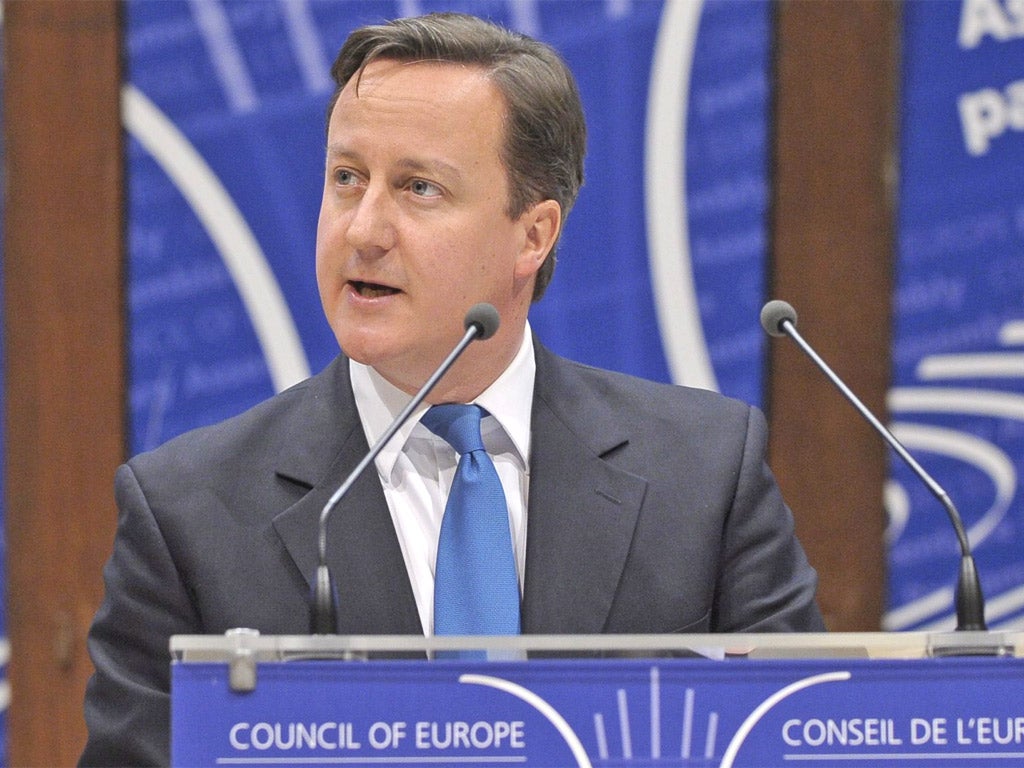The dangers of Cameron's human rights reform
Campaigners fear EU's most vulnerable citizens will be at risk. By Nigel Morris

Countries such as Russia and Turkey could be encouraged to flout the rulings of the European Court of Human Rights if David Cameron succeeds in his aim of sweeping reform of the institution, it was claimed last night.
Human rights organisations warned that the Prime Minister's demand for an overhaul of the court could backfire by undermining the basic protections it offers to citizens of central and eastern Europe.
Speaking in Strasbourg yesterday to the Council of Europe, of which the court is part, Mr Cameron argued that anger over some of its decisions were having a "corrosive effect" on support for human rights.
He detailed proposals to streamline its operation to prevent it becoming bogged down in trivial cases, including a call for long-running applications to the court to be automatically thrown out after a set period.
The plans, which follow last week's row over the ECHR blocking the deportation of extremist preacher Abu Qatada to Jordan, have proved popular with Tory MPs and sections of the press.
But they have dismayed the court's president, Sir Nicolas Bratza, who protested in an article in i this week that "senior British politicians" had betrayed their ignorance of the ECHR's history and legal position.
Mr Cameron avoided a potentially tricky moment during his visit to Strasbourg as Sir Nicolas was in court and unable to meet him.
One minister also admitted yesterday the strength of the tabloid-driven onslaught on the ECHR risked undermining Mr Cameron's attempts to win support for his reform blueprint in other European capitals. The Prime Minister is aiming to reach the outline of a deal among the Council's 47 members before Britain hands over the six-month chairmanship of the Council to Albania in May.
While human rights bodies last night acknowledged the need for reform, particularly to reduce the backlog of 153,000 cases before the court, they raised fears that Mr Cameron's criticism could undermine the ECHR's work.
Benjamin Ward, Europe and Central Asia deputy director at Human Rights Watch, said Mr Cameron's remarks would have an impact because Britain was a founding member of the court and a leading voice in Strasbourg.
He warned: "Criticism of the court by UK government ministers, or failure to correct misleading reporting about it in the British media, emboldens other governments, such as Russia and Turkey, that would prefer to ignore its rulings." He said reform of the court should not focus on limiting its jurisdiction or powers but putting pressure on European governments to respect human rights.
Tara Lyle, a policy adviser at Amnesty International UK, said Mr Cameron's commitment to upholding human rights was welcome but "undermined by proposals made by the UK which would make it harder for individuals to seek redress for human rights violations".
She said: "If the Prime Minister is serious about reminding people of the value of human rights, then he should approve even the unpopular conclusions the European Court arrives at, instead of pandering to those who jeer at European judgements."
In his speech, which was politely received, the Prime Minister warned the court risked undermining its own reputation by "going over national decisions where it does not need to".
He admitted that some British criticism of the court's application of the European Convention on Human Rights was based on "misinterpretation". But he insisted that there was "credible democratic anxiety" that insufficient account is being taken of the decisions of national parliaments on issues such as the Court's ruling that prisoners should be given the vote.
Mr Cameron said it was "not surprising that some people start asking questions about whether the current arrangements are really sensible" when Britain could not deport terror suspects despite painstaking efforts to ensure that they will not face torture after their return.
Subscribe to Independent Premium to bookmark this article
Want to bookmark your favourite articles and stories to read or reference later? Start your Independent Premium subscription today.

Join our commenting forum
Join thought-provoking conversations, follow other Independent readers and see their replies